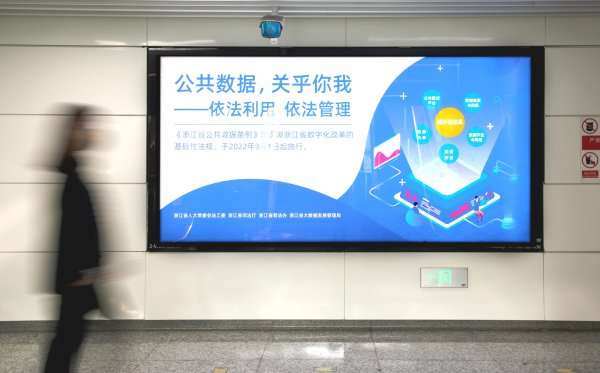
The poster of The Regulations in the subway station (Photo/Zhejiang News)
The Regulations on Public Data in Zhejiang Province is officially implemented on March 1 this year. It is the first local regulations on public data in the country.
The Regulations feature Zhejiang characteristics, with “digital reform” as one of the key words. The Regulations ensures the smooth progress of digital reform from the level of the rule of law, and provides a template for fully stimulating the value of new production factors of public data and promoting the modernization of governance capabilities.
The promulgation of the Regulations is conducive to further breaking the “data barriers” and enhancing the public’s sense of fulfillment. The head of the Provincial Big Data Development Administration introduced that the Regulations clearly stipulates that “data that should be shared need to be shared as much as possible”. This means that the full sharing of data between government agencies and the precision of government services will better promote Zhejiang to create “a province featuring mobile government services”.
The value of data lies in exchange and flow. In addition to sharing within the government agencies, the Regulations also makes systematic provisions for the orderly opening of public data to the society. The Regulations clarifies the scope and focus of public data opening, and requires the formulation of an open catalog and an annual open key list, giving priority to data that are closely related to people’s livelihood and urgently needed by the society.
Through full investigation and extensive solicitation of opinions, the Regulations has made a series of detailed and supplementary provisions on the basis of higher-level laws such as the Personal Information Protection Law, adding a “security lock” to personal information. The Regulations clearly stipulate that those who have been authenticated by valid identity documents shall not be forced to repeat the verification by collecting biometric information such as fingerprints, iris, and faces, unless otherwise stipulated by laws and administrative regulations.
The Regulations also strengthens the protection of personal information in emergency response. For example, the personal information collected during the epidemic investigation can only be used to respond to emergencies. After the emergency handling work is completed, security measures such as data storage should be taken, and relevant data applications should be shut down. Citizens who believe that open public data infringe on their legal rights and interests can submit a request to the public management and service agencies to withdraw the data, and the relevant departments shall promptly inform the parties of the relevant processing results.
Editor: Huang Yan




